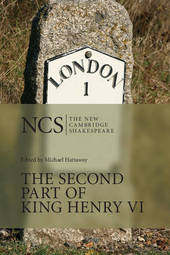
|
The Second Part of King Henry VI
Hardback
Main Details
| Title |
The Second Part of King Henry VI
|
| Authors and Contributors |
By (author) William Shakespeare
|
|
Edited by Michael Hattaway
|
| Series | The New Cambridge Shakespeare |
|---|
| Physical Properties |
| Format:Hardback | | Pages:266 | | Dimensions(mm): Height 229,Width 152 |
|
| Category/Genre | Shakespeare plays |
|---|
| ISBN/Barcode |
9780521373302
|
| Classifications | Dewey:822.3/3 822.33 |
|---|
| Audience | | Tertiary Education (US: College) | | Professional & Vocational | |
|---|
| Illustrations |
19 Halftones, unspecified
|
|
Publishing Details |
| Publisher |
Cambridge University Press
|
| Imprint |
Cambridge University Press
|
| Publication Date |
27 June 1991 |
| Publication Country |
United Kingdom
|
Description
Shakespeare's plays about the reign of Henry VI, written at the beginning of his career, were for a long time undervalued. This was because of doubts about their authorship and because of the difficulties of determining their theatrical provenance. Recently, however, a series of outstanding productions by the Royal Shakespeare Company and other companies has demonstrated their theatrical vitality, their conventions have been better understood in the light of new critical methods, and their innovative and sceptical questioning of Elizabethan orthodoxies has been viewed in the light of revisionist readings of the history of Shakespeare's own times. The Wars of the Roses haunted the Elizabethans, as is shown by the number of authors who wrote about them. Shakespeare's account was the most ambitious, the most dramatically innovative, and politically the most radical. This is the first major edition for over thirty years of The Second Part of King Henry VI. It takes account of recent discoveries concerning Shakespeare's early career, and pays particular attention to recent theatrical history, relating readings generated by modern performances to new ideologically positioned accounts of the history and politics of Shakespeare's age. As well as concerning itself with the nature of history, the role of conscience, and the relation between law and equity, this edition contains a complex reading of the kind of event that the Tudor regime had cause to fear, a popular uprising, led in this instance by Jack Cade.
|